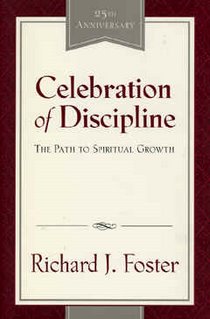 I'm currently reading this book I found while I'm in APTS called The Celebration of Discipline by Richard Foster. I have already seen it before at the ASCM library when a friend pointed it out to me and had made such impression that I knew I would read it soon. When I saw it in APTS bookstore it was the last one and as I flip through the pages an excerpt on simplicity immediately caught my eye. Indeed, how does one celebrate discipline? It seems those two words are contradictory. I believe I will soon discover. Reading through the pages, there are great insights from this seasoned disciple.
I'm currently reading this book I found while I'm in APTS called The Celebration of Discipline by Richard Foster. I have already seen it before at the ASCM library when a friend pointed it out to me and had made such impression that I knew I would read it soon. When I saw it in APTS bookstore it was the last one and as I flip through the pages an excerpt on simplicity immediately caught my eye. Indeed, how does one celebrate discipline? It seems those two words are contradictory. I believe I will soon discover. Reading through the pages, there are great insights from this seasoned disciple.Foster gives a fresh perspective on working in and out our righteousness (salvation for Rick Warren). He calls it objective and subjective righteousness. Latter being righteousness achieved by discipline and the former achieved by grace alone. The two are inseparable. Even the new testament had little distinction between the two because it was already understood that they come in one package. I liked how he explained that achieving righteousness is like growing a plant.. God alone can make it grow (grace) but it's the job of the farmer to cultivate it, water it and create the condition for its growth (discipline).
Going back to the YA event. There had been tons of memorable insights from all the sessions of the event. We had this speaker who went in as a sub for an absent speaker but Tom Bohnert's message perhaps penetrated deepest to the heart of the people. He talked about the love of God. I'm struck at how one could make an organized thesis from what seemed a basic, even diluted, topic. His insight on the healing of the leprous man by Jesus captured how we often judge ourselves so strictly and we would ask God "if" He want to make us clean when in fact He is delighted and readily willing to do it for us, because He loves us. He loves us because He is our Father. Sometimes we project our impression of Him through our perception of our earthly fathers and other people, but hearing that as a Father, God loves still love us even if we get into mess. Now this should not be grounds for abusing His love. Paul talks about how Freedom should make us love Him even more. Foster talks about sin that it is something that cannot be scored, that sinfulness is a state of being. Therefore God doesn't keep score of our sins when in fact our whole being is sin, until Jesus made Himself as sin in our place. I believe in order to worship God, one must know and discover His being first. Even though it wouldn't be possible to fully unfold His glorious Being, understanding and experiencing His Fatherly love alone satisfies that "God-shaped" hole in our being.

No comments:
Post a Comment